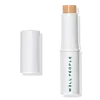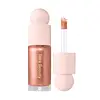What's inside
What's inside
 Key Ingredients
Key Ingredients

 Benefits
Benefits

 Concerns
Concerns

 Ingredients Side-by-side
Ingredients Side-by-side

Helianthus Annuus Seed Oil
EmollientRicinus Communis Seed Oil
MaskingCarthamus Tinctorius Seed Oil
MaskingCopernicia Cerifera Cera
EmollientSynthetic Beeswax
Emulsion StabilisingCastor Isostearate Succinate
Skin ConditioningMica
Cosmetic ColorantTocopherol
AntioxidantPolyhydroxystearic Acid
EmulsifyingCaprylic/Capric Triglyceride
MaskingSimmondsia Chinensis Seed Oil
EmollientRosa Rubiginosa Seed Oil
EmollientCrambe Abyssinica Seed Oil
Skin ConditioningIsostearic Acid
CleansingLecithin
EmollientPolyglyceryl-3 Polyricinoleate
EmulsifyingCalendula Officinalis Flower Extract
MaskingCamellia Sinensis Seed Oil
HumectantAloe Barbadensis Leaf Juice
Skin ConditioningMaltodextrin
AbsorbentSodium Benzoate
MaskingPotassium Sorbate
PreservativeCI 77891
Cosmetic ColorantIron Oxides
Helianthus Annuus Seed Oil, Ricinus Communis Seed Oil, Carthamus Tinctorius Seed Oil, Copernicia Cerifera Cera, Synthetic Beeswax, Castor Isostearate Succinate, Mica, Tocopherol, Polyhydroxystearic Acid, Caprylic/Capric Triglyceride, Simmondsia Chinensis Seed Oil, Rosa Rubiginosa Seed Oil, Crambe Abyssinica Seed Oil, Isostearic Acid, Lecithin, Polyglyceryl-3 Polyricinoleate, Calendula Officinalis Flower Extract, Camellia Sinensis Seed Oil, Aloe Barbadensis Leaf Juice, Maltodextrin, Sodium Benzoate, Potassium Sorbate, CI 77891, Iron Oxides
Isododecane
EmollientMica
Cosmetic ColorantHydrogenated Polyisobutene
EmollientHydrogenated Olive Oil Unsaponifiables
EmollientHydrogenated Styrene/Isoprene Copolymer
Octyldodecanol
EmollientDimethicone
EmollientGardenia Florida Fruit Extract
Skin ConditioningNelumbo Nucifera Flower Extract
Skin ConditioningNymphaea Odorata Root Extract
RefreshingPolyhydroxystearic Acid
EmulsifyingCaprylic/Capric Triglyceride
MaskingIsostearic Acid
CleansingHelianthus Annuus Seed Oil
EmollientTin Oxide
AbrasiveLecithin
EmollientPolyglyceryl-3 Polyricinoleate
EmulsifyingPentaerythrityl Tetra-Di-T-Butyl Hydroxyhydrocinnamate
AntioxidantCI 77891
Cosmetic ColorantIron Oxides
Isododecane, Mica, Hydrogenated Polyisobutene, Hydrogenated Olive Oil Unsaponifiables, Hydrogenated Styrene/Isoprene Copolymer, Octyldodecanol, Dimethicone, Gardenia Florida Fruit Extract, Nelumbo Nucifera Flower Extract, Nymphaea Odorata Root Extract, Polyhydroxystearic Acid, Caprylic/Capric Triglyceride, Isostearic Acid, Helianthus Annuus Seed Oil, Tin Oxide, Lecithin, Polyglyceryl-3 Polyricinoleate, Pentaerythrityl Tetra-Di-T-Butyl Hydroxyhydrocinnamate, CI 77891, Iron Oxides
 Reviews
Reviews

Ingredients Explained
These ingredients are found in both products.
Ingredients higher up in an ingredient list are typically present in a larger amount.
This ingredient is an emollient, solvent, and texture enhancer. It is considered a skin-softener by helping the skin prevent moisture loss.
It helps thicken a product's formula and makes it easier to spread by dissolving clumping compounds.
Caprylic Triglyceride is made by combining glycerin with coconut oil, forming a clear liquid.
While there is an assumption Caprylic Triglyceride can clog pores due to it being derived from coconut oil, there is no research supporting this.
Learn more about Caprylic/Capric TriglycerideCi 77891 is a white pigment from Titanium dioxide. It is naturally found in minerals such as rutile and ilmenite.
It's main function is to add a white color to cosmetics. It can also be mixed with other colors to create different shades.
Ci 77891 is commonly found in sunscreens due to its ability to block UV rays.
Learn more about CI 77891Helianthus Annuus Seed Oil is the oil derived from the seeds of a Sunflower. Sunflower seed oil is non-fragrant. It is an emollient, meaning it helps to soften the skin.
Sunflower seed oil contains many fatty acids. The fatty acids found in sunflower seeds include (from highest amount to least): linoleic acid, myristic acid, palmitic acid, stearic acid, arachidic acid, oleic acid, and linolenic acid.
These fatty acids help the skin create ceramides. Ceramides play a role in repairing the skin barrier.
Helianthus Annuus Seed Oil helps moisturize the skin. This in turn helps the skin look more rejuvenated and smoother.
Sunflowers are rich in vitamin E.
Historians believe Indigenous cultures of North America domesticated sunflowers before corn. Thus they relied on sunflower oil for a variety of uses. One such use is moisturizing skin and hair.
Sunflower seed oil may not be fungal acne safe. We recommend speaking with a professional if you have any concerns.
Learn more about Helianthus Annuus Seed OilIsostearic acid is a saturated fatty acid. Its structure makes it a great surfactant.
Surfactants help decrease the surface tension between two liquids. This property also makes it an effective emulsifier. Emulsifiers help prevent waters and oils from separating in a product.
Isostearic Acid is created from oleic acid.
This ingredient may not be Malassezia folliculitis, or fungal-acne safe.
Learn more about Isostearic AcidLecithin is a term for a group of substances found in the cell membranes of plants, animals, and humans. They are made up of mixture of phospholipids.
This ingredient has emollient and emulsifying properties.
As an emollient, lecithen helps soften the skin and creates a barrier to keep moisture in.
As an emulsifier, it also helps prevent water and oil ingredients from separating. Lecithin can also help ingredients be better absorbed by the skin.
This is because the phospholipids in lecithin produce liposomes. Liposomes help other ingredients get through the skin barrier.
Depending on the source of this ingredient, lecithin may not be fungal acne safe. This is because some sources of lecithin come from soybean oil, which may feed the malassezia yeast that feeds fungal acne.
We recommend reaching out to the brand you are purchasing from to inquire about the source of their lecithin.
Some other names for this ingredient include soy lecithin and deoiled soy lecithin.
Learn more about LecithinMica is a naturally occurring mineral used to add shimmer and color in cosmetics. It can also help improve the texture of a product or give it an opaque, white/silver color.
Serecite is the name for very fine but ragged grains of mica.
This ingredient is often coated with metal oxides like titanium dioxide. Trace amounts of heavy metals may be found in mica, but these metals are not harmful in our personal products.
Mica has been used since prehistoric times throughout the world. Ancient Egyptian, Indian, Greek, Roman, Aztec, and Chinese civilizations have used mica.
Learn more about MicaThis ingredient is an emulsifier. It is created from Polyglycerin-3 and Ricinoleic Acid.
As an emulsifier, it prevents waters and oils from separating. According to a manufacturer this ingredient is fully biodegradable.
This ingredient may not be safe for Malassezia folliculitis due to its Ricinoleic Acid base. Ricinoleic Acid is a fatty acid derived from castor oil.
Learn more about Polyglyceryl-3 PolyricinoleatePolyhydroxystearic Acid is a soft wax made from castor oil.
It is is a texture thickener, emulsifier, and film-former. Emulsifiers prevent ingredients from separating, such as oils and waters.
Polyhydroxystearic Acid may not be fungal acne safe.
Learn more about Polyhydroxystearic AcidThis ingredient is a combination of red, black, and yellow iron oxide pigments. This combination of colors is usually found in foundation, because it results in a "skin" color.